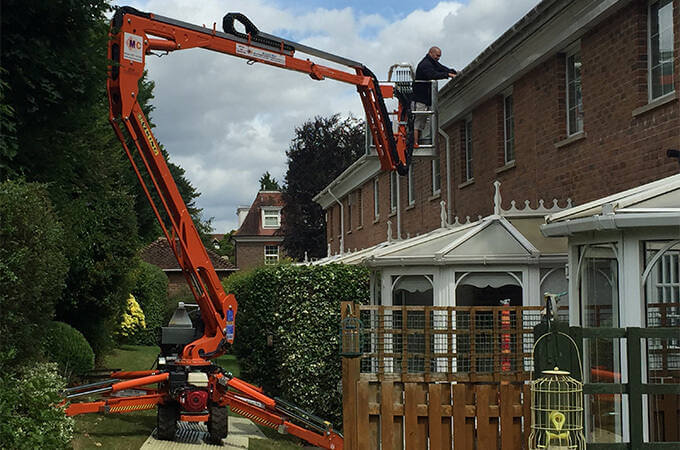Clogged gutters prevent water from channeling away from your home, leading to damage like wood rot and foundation problems. They also become a breeding ground for mosquitoes.
Gutter maintenance is vital to your home’s health, so it should be done regularly. It’s best to do it twice a year in the fall and spring. Visit https://guttercleaningcharlestonsc.com/ for more information.
Ideally, gutters should have a slight slope so water flows down and into the downspouts. Gutter systems with an improper pitch are prone to clogs, overflowing, and even damage to the roof and siding. You can check if your gutters are properly pitched by climbing up the ladder and using a level to measure the slope.
If the gutters are poorly sloped, you can make a few easy adjustments to get them working properly. First, make sure the gutters are free of debris and test their slope by dumping water from a bucket into one end. The gutters should flow down smoothly, but if they start pooling or stalling, it’s time to adjust the slope.
A proper gutter pitch should be about 1/4 inch of slope for every 10 feet of gutter. So, if the gutter is 25 feet long, it should have a slope of about 2.5 inches per foot (25 / 10). If you’re not comfortable performing this task yourself, you can hire a professional to do it for you.
Another easy way to test the gutters is by measuring the distance between the high and low points of the gutter. The low point should be where the downspout is, while the high point should be the opposite end of the gutter. This should be the same distance for both ends of the gutter, but if it’s not, you’ll need to repitch it.
Re-pitching the gutters can be a tricky and dangerous task, so be sure to take your time and use a sturdy ladder. You’ll also need to have a ladder long enough to reach the whole length of the gutters. Once you’re done, testing the gutters again by pouring water down them is a good idea. You can also use the same method to reseal the joints and seams. After sealing them, be sure to smooth the sealant with your fingers or a tool to ensure it’s evenly distributed and there are no air pockets. This is a critical step in gutter maintenance since it helps prevent leaks, rust, and other problems down the road.
Clean the Gutters
Getting out the ladder and cleaning the gutters is not anyone’s favorite weekend chore, but it’s one of those things that needs to be done to keep your roof, foundation and landscape protected. Clogged gutters can lead to water damage and even crack your roof. So, unless you want to pay for expensive repairs later on, schedule regular gutter cleaning sessions. In general, you should clean the gutters twice a year, once in spring and once in fall. If your home is close to large trees, however, you may need to clean more often.
Before you begin cleaning, make sure that you have the proper safety equipment. This includes heavy work gloves, non-slip shoes and a sturdy ladder. If your home is more than one story high, consider hiring a professional to avoid potential injury. When setting up the ladder, be sure to place it on even ground and not lean it against the gutters themselves. It’s also a good idea to have a second person below the ladder to prevent it from falling over.
Once you’re safely perched on the ladder, remove any clogs with a garden hose or a manual plumbers auger. Then, use a hand trowel to scoop the remaining gunk into garbage bags. Be sure to check the downspouts for clogs as well. Once you’re done, rinse the gutters down and wipe them down to remove any remaining debris.
There are a number of different gutter guards on the market to help you protect your gutters from clogs. Some are screens that sit on top of your gutters and prevent any debris from entering, while others resemble fencing or mesh and can be placed under the first course of shingles. If you decide to choose a screen gutter guard, you’ll need to take care to remove any debris that gets stuck in it.
You can also repair any leaky seams in the gutters and downspouts using gutter patching kits, which you can find at most hardware stores. Once the patch is dry, apply a coat of waterproof sealant to the gutters and downspouts to ensure that water will flow freely through them.
Check the Downspouts
Gutter systems are meant to channel rainwater and snow melt away from your home’s foundation and siding. That means they have to be free of clogs and properly placed to work effectively. Clogged gutters allow water to pool around your home, which can cause serious damage over time.
When cleaning your gutters, make sure to check the downspouts as well. The downspouts are integral to the overall function of your gutter system, funneling water and debris down through them and onto the ground. They can become clogged with small leaf fragments and other debris, so a regular maintenance routine is essential.
Once you’ve cleaned the gutter sections, you should have a clear view of how the downspouts are functioning. If water pools at the mouth of the downspout, it’s a sign that the gutter and downspout system aren’t working correctly. If it flows naturally without any pools, you can consider this a successful gutter and downspout maintenance routine.
If you find a clog, it’s important to address this right away. This may mean using a plumber’s drain snake to unclog the downspout. It may also involve removing and replacing the downspout cage, a mesh material that covers downspout openings. If water flows naturally after you unclog the downspout, it means the clog is cleared and your gutter and downspout maintenance is complete.
When you’re done, it’s a good idea to walk around and tighten any gutter hangers that are loose or appear loose. This is especially important in the winter when snow and ice can add weight to your gutters, making them more likely to fall off during a storm. A simple screwdriver can do the trick to retighten loose hangers. This is also a great opportunity to ensure the gutters are securely mounted to the fascia boards and joists. If any of the screws are showing signs of wear, they should be replaced immediately. This will help to ensure the gutters don’t pull away from your house or sag over time, which can lead to structural damage and leaks. This is a simple task that shouldn’t take more than a few minutes to do.
Prepare for Winter
Winter’s harsh weather, with freezing temperatures, ice buildup and snowfall, can cause damage to gutters and roofs. It’s a good idea to get your gutters ready for the season by doing some preventative maintenance.
First and foremost, have your gutters inspected for cracks and other signs of deterioration. If your gutters are corroded, it may be time to replace them. Gutter materials are available in a variety of styles and prices, so you can find a system that best suits your needs and budget.
Gutter maintenance should also include cleaning the gutters to prevent clogs and ensuring that downspouts are properly directed away from your home’s foundation. This will ensure that when the melting snow and rainfall occur, the water doesn’t flow past the gutters and into your home.
Another essential step is assessing gutter seams and anchors. High winds in winter can easily scratch or bend gutters, especially those made of less weather-resistant material. When you’re inspecting your gutters, make sure that you have a sturdy ladder and you know how to use it properly. If you’re not comfortable working from a ladder, have someone else do the work for you.
The final gutter maintenance task is examining the downspouts for signs of clogs or improper draining. Clogged downspouts aren’t just inconvenient; they can actually lead to water damage inside your home. If you notice a clogged downspout, try pouring hot water over the clog to melt it.
Once the gutters are clean and inspected, they’re ready for winter. If you have any repairs or maintenance to do, it’s a good idea to have a professional complete the job before winter sets in. The same applies to HVAC maintenance, power washing, exterior painting, chimney repairs and roofing inspections and repairs. When you call a professional for these jobs, they will have the tools and experience to help your home look its best.



